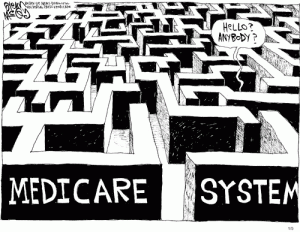The attacks on Assisted Living continue. Why we need to set our own standards.
This morning one of my readers sent me a link to a new story about a family that is suing Sunrise Senior Living in which family members allege Marie-Rose Demkowicz had a series of falls and then at some point in time developed pressure ulcers and died. Here are some of the allegations:
- “But a pending lawsuit filed by the family charges Marie-Rose fell about 14 times at the Sunrise facility. The family says most of the falls happened after she used a call button to request help when she had to go the bathroom.”
This reinforces the need to talk about assumed risk, what we can and cannot do and quality of life. In addition, while the lawsuit alleges the staff did not respond quickly it is hard to know what that means. I cannot imagine that Sunrise or any assisted living or skilled nursing community would promise instant response.
Perhaps even more frustrating is that it appears they are not suggesting these falls resulted in any actual harm to the resident (I have not read the lawsuit). The issue of falls is tough, but the only way any senior community could possibly have zero falls is to heavily drug or physically restrain residents, which would mean a terrible quality of life.
- “Some staff would reset the call button after they did come so that records would reflect an acceptable response time. But they would tell his mother, “I’ll be right back and it would be another 20 minutes.”’
On the face of it this seems unlikely at least with respect to being helped in or out of the bathroom. It is inconsistent with basic human compassion and it is inconsistent with how a company like Sunrise operates.
- “Marie-Rose developed a Stage IV pressure sore that became infected, required surgical treatment and other procedures, “all of which caused or contributed to causing her death.”’ . . . . ‘“What’s shocking about this case,” says Attorney Steve Levin, who filed the suit, “is that once they were Stage Three and Stage Four pressure ulcers, they kept her as a resident in direct violation of the law.”’
Again this is one is an attorney speaking in a fashion that generates maximum outrage. Is it possible this happened? Maybe . . . and if it did that is a terrible thing. But I would sure want to hear Sunrise’s side of the story before stoning them.
- Finally the news article contains a short laundry list of other area lawsuits where Sunrise is named.
There is no way to know the merit of any of these legal actions, but is does serve to smear Sunrise.
What We Know
There are some things we all know, and often don’t want to talk about but should:
- We know that attorneys and news outlets love anything that generates outrage and both sides are more than happy to tell only one side of the story.
- Attorneys are always on the lookout for deep pocketed easy pickings targets to sue and it appears that assisted living is moving to front and centered.
- There is a vast amount of variability in the regulatory rules from state to state.
- There are some bad operators out there that need to be punished or shut down.
- While some states have fairly specific standards it is largely up to each company to figure to establish their own training, staffing and care standards.
- The industry is in significant danger of more regulation at the state level and possibly even a push for some level of federal regulation or oversight. While it is clear that in some states like California better regulations are needed, overall more regulations will make care more expensive and counter intuitively it will lower the bar for what good care looks like.
Our Own Gold Standard
I am convinced that ALFA, LeadingAge and AHCA need to convene a blue ribbon panel of large, medium and small operators to create some guidelines (maybe even a certification process like The Eden Alternative has) for assisted living. It should include things like:
- Initial training
- On-going training
- Staffing ratios
- Medication guidelines
- Satisfaction surveys
- Emergency call response times
If we as an industry are unwilling to do this you can be sure there will be more lawsuits, more regulations and the whole industry will be damaged. Steve Moran
If you like this article or even if you don’t, it would be a great honor to have you subscribe to our mailing list HERE.









Steve, Wow again. Another totally slanted pro-industry post that’s even more egregious than the other posts.
You even admit that you didn’t read the lawsuit but still find basis to mock and belittle their suits concerns! It seems that there isn’t anything improper that a facility can do in your mind.
-Daniel
Wow Daniel these comments always make me smile here is why:
1. Senior Housing Forum is a pro industry website and I am a pro senior living writer. So I make no apologies for that.
2. I did not either mock or belittle the lawsuits, rather I pointed out there are two sides to every lawsuit. Specifically two things: There was in the article no allegation that the falls resulted in any harm. Secondly it is impossible to prevent falls 100% of the time unless seniors are physically or chemically restrained. The article would have been a lot more credible if they gave even a nod to the resident rights/quality of life issues related to falls.
3. You clearly don’t care about stories being one sided unless they are on the wrong side of your view. Because this story addressed none of the realities of providing senior living.
4. Your comment was a pure attack. You didn’t actually offer any commentary on my suggestions good or bad which is pretty frustrating. So I will be pretty direct. What are you proposing to make the industry better?
Finally last time you complained about my bias I offered to let you write an article taking me and or the industry to task and I promised to publish it. The offer still stands.
Steve
As a note readers: Last time Daniel accused me of being an industry hack, I made him an offer in the comments section and via email and received zero response. I don’t moderate comments like this but hit & run attacks don’t do anything to make the industry better.
I agree with Steve. It’s not constructive to be anti-industry and it may simply mirror a kind of existential anger that seeks an outlet. If reforms are needed let’s be specific about what the need is, why the cost of change is justified, how best to bring it about, and why the industry can benefit from change. Mere argumentation may be the stuff of cable news but it’s not helpful in addressing societal challenges.
Our common purpose should be how to better serve a frail and needy population who are vulnerable to neglect but who are also high maintenance. Caring for these people is a noble calling and should be seen as such.
We should take public perceptions as mirrored in the ProPublica studies as a challenge to meet expectations and to let the public know what is being done. ProPublica’s apprehensions about today’s eldercare industry and its regulatory oversight is widespread among public perceptions. Assisted living can seem like incarceration and no one wants to be incarcerated in an uncaring, venal environment.
Andy Smith’s affirmations on behalf of Brookdale at yesterday’s news conference are what is needed. He is setting the Brookdale aspirations high and he has the talent to lend credibility to the possibility that Brookdale will, in fact, raise the bar for senior living and senior services performance.
Caring for people who are nearing life’s end is never going to be easy and there are many who wouldn’t want to carry that burden but who are ready to criticize those who do. And the plaintiffs’ bar in the United States is a powerful political force that is not always held to a high standard of professional responsibility.
By putting people first, there is a strong chance that Brookdale may become the imaginative, innovative engine for elevating eldercare standards that is needed and for consolidating the industry into a more coherent whole. If the public learns that Brookdale is a name that can be trusted, then Brookdale will prosper.
Jack your comments are right on. Thanks for contributing to the conversation.
Steve
As a retired attorney, now a consultant to folks with aging loved ones, I am aware of both the assisted living industry’s contribution to the quality of life of elders and the bar’s commitment to bring changes through lawsuits against offenders. I’m also an RN who spent a lot of years caring for aging patients. Steve, your comment here is as anti-professional as those you accuse others of making:
“Attorneys are always on the lookout for deep pocketed easy pickings targets to sue and it appears that assisted living is moving to front and centered.”
When it comes to advancing the rights of the vulnerable, there is no such thing as “easy pickings”. Tragic stories are actually taking place. Face the truth. Most AL is just fine, but some as you say yourself have bad operators. Do you just ignore them? Or do you say people have a right to go after the bad operators? Let’s be honest and don’t blame the families who want redress of their justifiable grievances against bad places. Their loved ones suffer unnecessarity and die before their time in some of these facilities. Let’s admit that some facilities need considerable improvement. Let’s admit that some facilities should not keep residents for whom they cannot and should not offer care. Let’s work on making AL work better for the residents who are marginal. It requires dialog and working with consumers to get it right. Blaming and accusing lawyers who represent aggrieved families does nothing to advance the genuine interests of committed AL operators who try hard do what’s right. Resolving the conflicting points of view requires seeing both points of view. I suggest you look outside your own.
Carolyn, I agree that an industry that cares for a frail population, many of whom have reduced discernment and may be gullible, and others who may be unable to fend for themselves if those who care for them neglect their duties, should be held to account. You may well be an idealistic and committed member of the plaintiffs’ bar.
The challenge is that not all members of plaintiffs’ bar are equally responsible. The absence of any liability or sanction for ill-considered litigation encourages misuse of our judicial system on which we depend for responsible fairness and ethical behavior. Some attorneys know that a defendant may well settle an unjustified lawsuit because it is economically cheaper to pay the plaintiff’s attorney’s fee than to try to take the moral high road.
If plaintiffs’ attorneys, who take a case on contingency, and who fail to prevail in litigation were required to pay the defendants legal defense costs, and if the plaintiffs’ attorneys had to escrow sufficient funds to be sure that they would be able to meet that hurdle, then there might be justice in what now can often turn out to be an unfair system.
It’s true that the regulatory system does not give the public protection that is desirable. That was evident in the recent joint hearing in the Sacramento legislature. An effective and responsible plaintiffs’ bar can be a better tool for ensuring that businesses operate with full responsibility to meet their stewardship burden. That is sometimes the case when executive self-interest or self-aggrandizement is allowed to trump the mission and purpose for the business.
But the fact that some litigation on behalf of plaintiffs is justified does not excuse a system that has no disincentives for rogue litigation instituted by some attorneys. When an attorney says, “If we have a plaintiff, we have a case,” then we can conclude that those admitted to the Bar of Justice do not always serve that higher common interest in a fair system of dispute adjudication or for calling irresponsible parties to liability for their careless and ill considered acts.
Reform of our justice system is within our reach if only we would put the common interest before the special interests of those who sometimes unjustly profit for a system that encourages ill considered litigation.
If the common interest is justice, then consider that our legal system allows juries to decide what is ill considered and what is not. They sometimes get it dead wrong for sure. But without our jury system, most ordinary people would have no chance for justice. Juries also get it right a lot of the time. If it were YOUR matter and you wanted it decided by 12 strangers, you might not be so quick to condemn the entire system. There is no one answer. There are differing points of view. And incidentally I am a retired attorney. I spent years in the justice system and do not think I’m idealistic about justice. Too late for that, buddy. However, I am still idealistic about quality of life for aging loved ones. I happen to think that assisted living is one way to achieve that idealistic goal.
I didn’t condemn the entire system. Let’s just leave it at that.
Steve, you are right again about the need for an organization that establishes standards for the areas of assisted living operations you listed that assisted living organizations could voluntarily adopt. Fortunately, such an organization already exists! CARF, the accreditation organization for aging services, has separate accreditation for assisted living facilities. We at Eliza Jennings like that CARF accreditation is based on performance improvement principles and is person-centered as well. We think our investment in CARF has been well worth the time and money.
People need to be vigilant when it comes to the care of their loved ones. So many people seem to be content to just drop off their parents in some home and forget about the rest.
It’s important to take a look through the facilities and talk to the staff AND the patrons.
You are correct you need to be vigilant but you do not really know what a place is like until the “honeymoon ” period is over. They will say anything to get you in the door. I do not believe so many people just drop off their loved one. I do believe that is what they would like you to do. That way they don’t have any interference from the family.
Steve I have first hand experience with this Sunrise and let me tell you it does take a long time for them to answer a call button. I have pulled the cord in the bathroom and pressed the button on the necklace and still have had to call for help for my mother! They are poorly trained and under staffed. You would think it basic human compassion but when you are under staffed and poorly trained there is very little basic human compassion. It’s a for profit company and making a profit seems to be top priority.